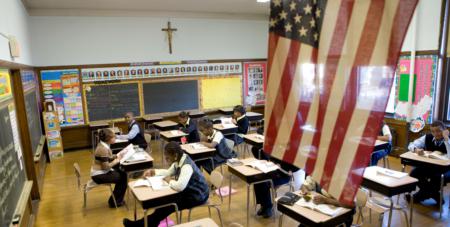Teaching children, not topics
As I have travelled throughout the archdiocese for the last eight months, I have met many great teachers. They are professional, dedicated, and joyful. They delight in their vocation and engage our students in the learning process. They create learning environments that support faith and intellectual development. They care for their students.
In "The Grammar of Catholic Schooling," Richard Jacobs indicates that there are six rules that influence a student's moral and intellectual achievement. There are two of these rules that I believe are critical to creating an atmosphere where students thrive and engage in learning at a very high level.
The first is this: "The subject of education is the student." This is such an important statement and a way to distinguish Catholic education from other forms of education. It means that we teach students, not content. It means that when people ask us what we do, Catholic educators respond, "I teach students or children." Our content areas cannot be the answer. To respond, "I teach math," indicates that the content is more important than the student and our faith and Church does not allow for content to be more important than the individuals we teach. Curriculum, pedagogy, or instructional strategies are all significant for student success and engagement, but our students and their needs are of primary importance. If we do not know our students and their needs, we are less effective. We don't maximize the possibilities of Catholic education. The subject of any form of education must be the student. The subject of Catholic education is always the student or we are not modeling our work after the master teacher, Jesus Christ. We are less than who we can be when we forget that our students receive the benefit of our actions as teachers.
Jacobs has another rule that he states influences a student's moral and intellectual development: "Teaching is an intimate communication between souls." This is a beautiful description of what happens in Catholic schools in the Archdiocese of Boston.
During my career I have been able to visit many schools -- public, private, and Catholic -- on school improvement visits. There are many similarities and many differences. One of the most profound is the answer to the question, "What's the best thing about your school?" In almost all public and private schools the response is, "We're a great community!" In Catholic schools, the response from parents, teachers, parishioners, and most importantly students is, "We are like a family. We care for each other." The difference between the words "community" and "family" describes that "intimate communication between souls." The relationships formed in Catholic schools are like family. They are full of love, quirks, arguments and healing, much like any family. When the chips are down, Catholic schools come together and support each other. Our relationships with those who work with us and the students we teach are essential to our success. They remind us that our schools are more than a location where the learning of reading, writing, and arithmetic takes place. These relationships remind us that we have been entrusted with the care of children and that our vocation demands that we show them the ways of the Lord and not just the structure of a sentence or the algorithm of Algebra.
Our students should know that we care, and I believe that they do. We show them who Christ is through our actions. When visiting Lowell Catholic High School, one of the students told me, "My teachers just want me to do my best. When I don't do as well as I could, they tell me and when I do my best, they tell me. They are always willing to help me." A kindergartner at Quincy Catholic Academy told me, "My teacher is fun. She likes to see my smile." These two students are evidence of the relationships our teachers and students forge to enhance the teaching and learning process.
"The subject of education is the student. Teaching is an intimate communication between souls." When we get these two things right, we engage our students and they learn more. When we know, love, and serve God through knowing, loving, and serving our students, we are well on our way to forming students who are educated and formed in our faith.
KATHY MEARS IS THE SUPERINTENDENT OF CATHOLIC SCHOOLS IN THE ARCHDIOCESE OF BOSTON.
- Kathy Mears is Superintendent of Catholic Schools in the Archdiocese of Boston.



















